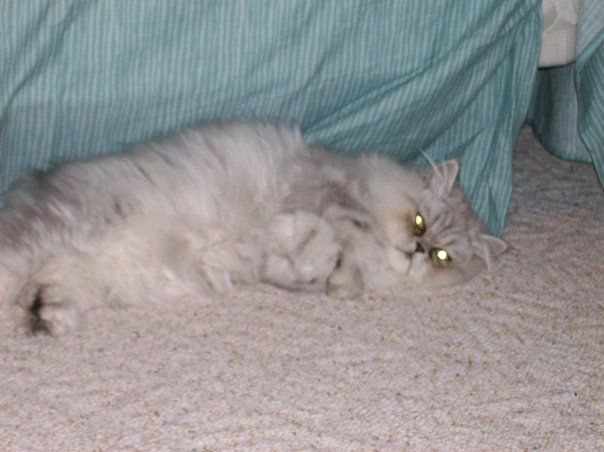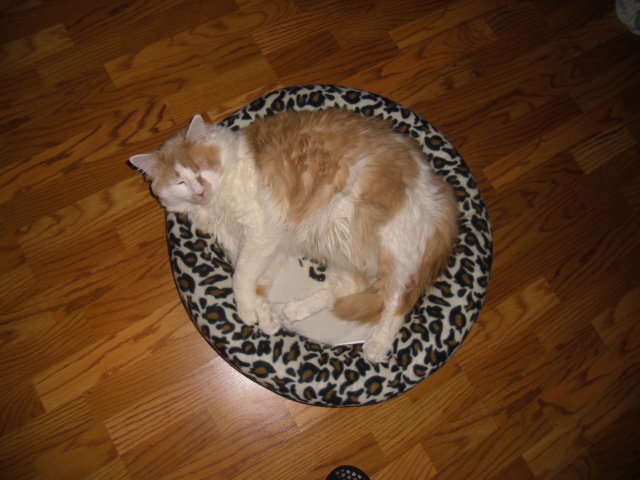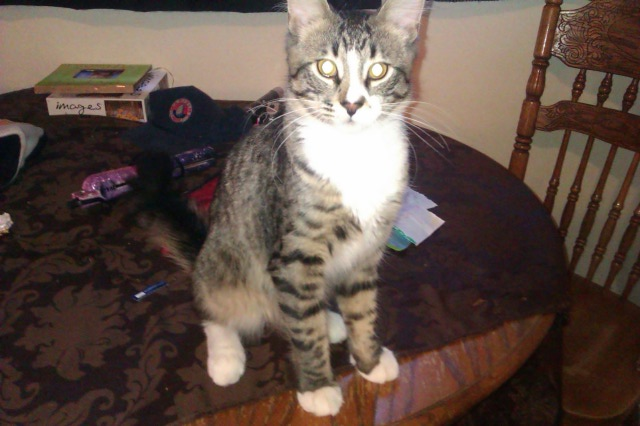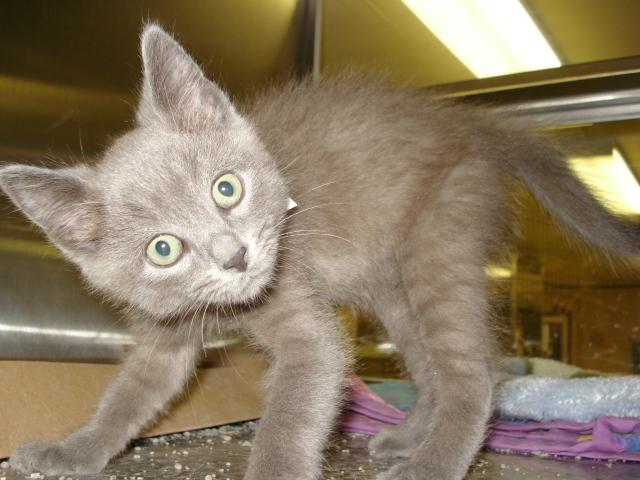QuestionA couple of months ago we got a Main Coon from a rescue service. He \has always been very well adjusted, was used to other animals prior to coming to us and has gotten along well with everyone. He had been boxed trained, checked out medically and fixed. He is healthy and a very mellow cat. But,
He keeps peeing on blankets. None specific. He also goes in his box, which is cleaned every day. We have to close every door in the house and ensure that the laundry room door is left open for easy access. I even go so far as to, when I'm home, which is most of the time, to pick him up and put him in the laundry room and close the door. wait about 15 minutes and make sure he's gone pee.
He still pee's on couch throws or baskets of clothes. I'm about out of patience. I don't know what to do.
AnswerMary,
You didn't say how soon after you brought him home that he started urinating on things. Some cats become very anxious when changing environments, and despite the shelter not being a very good home, it was home for a time for your cat. He became comfortable there, and that became home. Then, he's suddenly whisked out of there and into a strange environment that he must adjust and adapt to, and unfortunately, many rescue/shelter kitties have these problems. Voiding inappropriately is one of the ways cats manifest their anxiety, fear, or anger. I would also call the rescue, if you haven't already, and ask if he ever voided on objects or outside his litterbox (that they saw or know of) while he was there. If not, then I would bet his inappropriate voiding is due to anxiety.
To correct these behaviors, it involves lots of patience, and rewards for good behavior. You never want to get angry or upset with your cat, or yell or shove its face in its accident, because that will only serve to scare the cat more, and make him more scared of you instead of bonding with you, which is what you ultimately want. I would stop locking him in the laundry room and waiting for him to go. That is negative behavior, and if he doesn't have to go, then he has no idea why he's being locked in there, and views that as punishment. If anything, he will eventually become scared of the room, and that will worsen his inappropriate voiding.
Next to anxiety, fear, anger, cats also urinate inappropriately for these reasons: UTI/pyelonephritis (kidney infection), dislike of litter, dislike of litterbox, dislike of litterbox location. You will have to address each of these areas to ensure you've addressed every possible source of his voiding outside his litterbox.
First, it's absolutely imperative to have his litterbox in a safe (to him) location, out of the way of people and noise, and somewhere where he can have his privacy. The laundry room is often one of the worst places to put a litterbox because it's everything but quiet and out of the way. I would consider changing the litterbox location. But laundry rooms are often located in such a place that people have to walk through them to go out to the garage or into the rest of the house, the washer and dryer are loud when they're running, and it's often a loud place because people will often shout or yell as they head out to the car. If your lanudry room is elsewhere, like upstairs or on the first level but in another area not by the garage, or even in the basement, the laundry room will still never be ideal for a litterbox. Just the noise of the washer and dryer will cause anxiety and fear, and that is often enough for a cat to NOT want to use the box.
The litterbox should be placed in a quiet bathroom, that is not used very often, or a spare bedroom, or even a part of a hallway, that may be out of the way, again, where no one really goes. Try to think of it from the cat's point of view. They are exactly like us when it comes to toileting. We would NEVER go to the bathroom in public without a door. We want our privacy, and areas that are loud and noisy tend to make many of us uncomfortable. If the bathroom is dirty or not cleaned, we really don't want to use it, and may even try to find another place to go that's cleaner. Cats are the same way. You state you clean the litterbox every day. I would clean it after every BM and every void. Cats are really very fastidious, and although cleaning the box daily is excellent, you should get in the habit of scooping out poop after every time he goes, and if you use scoopable litter, scoop out the urine balls, or if it's clay litter, rake through the litter with your scooper so that the wet litter gets distributed and doesn't just sit there. That way it has a chance to dry, and the litter is freshened up a little bit. You state you're home most of the time, so this should not be an issue. Even if you're out, just make it a point to go straight to the litterbox when you get home, rake through the litter, and clean out whatever is there. Your cat will appreciate that!
The other reason cats stop using the litterbox is tied in with the first one--fear. Some cats may have been in their litterbox peeing, when there was a loud noise, or someone walked through loudly, or someone yelled, etc, and that scared him to the point where he associates the litterbox and peeing with those noises. While he still uses the litterbox, he's obviously not using it 100% to pee. So, if something scared him while he was in there peeing, he may be just scared enough that he doesn't feel comfortable all the time, hence the peeing elsewhere. And again, if his box isn't in a quiet area, he will be more likely to be scared by noises that occur when he's in his box than if he were in an out of the way place that's quieter.
What litter are you using? Scoopable? Is it scented? If it is, or even if it has a very mild, barely visible scent, get rid of it. Cats sense of smell is 7x more sensitive than ours. So, what we may not smell, they very well do, and it could be very strong to them--enough to avoid it as much as they can. So purchase a litter that is unscented. You may also need to investigate or try different brands of litters and different textures. Cats paws are very sensitive and tender, and sometimes larger litter pellets can be painful on their feet. Some cats prefer the finer texture, smaller pellets (frequently found with scoopable litter). But other cats prefer clay litter (non-scoopable) and with larger size pellets, so it's definitely a personal preference, but many cats will let you know their dislike by not using the box. I recommend a soft scoopable unscented litter. I like "Word's Best Cat Litter" and any of the Dr. Elsey litters. Additionally, Dr. Elsey has a litter additive for cats that are peeing outside the litterbox. It's called "Cat Attract." You add it in addition to the regular litter. It contains pheromones and I believe herbs that attract the cat to the litter. Many cat owners have had great success with this, so it's worth a try.
Maine Coons are large cats. I have a maine coon, and she's a big girl. I went through 4 litterboxes before I found one that was big enough for her! I lost my 18 yo Himalayan last June, and she was tiny, and when I put her to sleep, she only weighed 4.5 pds. So, her litterbox was perfect for her---your average run of the mill litterbox. However, when I got my maine coon, she was almost 3x bigger than my baby I lost. She went into the litterbox I had already, and she took up the whole box! She could barely turn around, she was stepping all over her waste, she was crouched down and was all stooped over (it was a hooded litterbox). I quickly realized she needed a bigger box. So I bought another one that looked huge in the store, but when I brought it home, it wasn't much bigger than the other one. So I did some research and bought one online that was recommended in an excellent book I have. That one was HUGE, and perfect for her, but for some reason, she still didn't look comfortable. So, one day I was at Petco, and there was a litterbox that looked fairly large, but was only half covered. The very rear of the box was covered, but the rest was open. She appeared so much more comfortable using the box, and to this day, that's the box she uses. I finally realized that due to her size, she needed a box that wasn't covered. She stands tall, and having that hood over her was severely affecting her comfort and ability to use the litterbox. I'm sure if I hadn't changed the box, she would have had litterbox problems too. It's absolutely imperative to re-evaluate his box and see if it's appropriate for his size. If it's covered, you may need to get one that's not covered. In fact, most cats don't like covered boxes. That is more for our convenience than the cat. A cat just wants a clean place to go, and they're happy. Now, a cat that is used to using a covered box may insist on having one, but a cat that has never used one before or has only used one a few times, probably would prefer an uncovered one. So be sure to make sure the box is big enough for him. The criteria behaviorists use to determine if the box is the right size is: can the cat stand up fully in the box, can it turn around without difficulty and have a little extra room for moving around, and does it not step in his waste? If he can do those 3 things, then the litterbox should be okay size wise.
Now, health problems cause a dislike of the litterbox as well. If he has a UTI, that can be extremely painful, and because cats are masters at hiding when they're hurt or in pain, he may appear fine, but he's really hurting. Has your vet done a UA? I would insist that be done, especially because in male cats, these type of infections can be much more dangerous. Also check to see if he has crystals, because a crystal in a male cat can rapidly lead to a complete blockage, which is a veterinary emergency. These reasons are perhaps the number one reason cats stop using the litterbox, or don't use it all the time. This could be the whole problem right here.
Finally, when a cat pees somewhere, it's imperative to clean it up with the right cleaners. If you just use soap and water, or a store bought cleaner, that won't break down the stain itself, and when moisture or humidity hit that stain (like the cat peeing on it again), the stain will reappear. Cat urine contains high amts of ammonia, which is a cat attractant. If a cat smells someplace that he peed before (because it wasn't cleaned up properly), it tells him that it must be okay to pee there because the smell is still there. After all, he smells that same smell in his litterbox, and he's allowed to go there and is praised for going there, so this must be okay too. That's what the cat is thinking. In order to completely and correctly clean that stain (and really, the odor), you must use an enzymatic cleaner, or a molecular odor eliminator. These are more expensive, but they're the only products that will remove a stain and its odor and therefore, prevent the cat from coming back and peeing there, or around there, again. Some good products are: "Zero Odor," "Urine Erase," "EnzymD," and "Urine-Off." I don't think these can be bought at big supply pet stores, but they may be. Otherwise, you can check smaller independent pet stores, or order online. There may be other products out there sold at Petsmart or Petco that may work fine, but just check to make sure they say something that they are a molecular odor eliminator, a bacteria/enzyme neutralizer, an enzyme, or an encapsulator. If it says it's one of these, than try it. If it doesn't say anything like this, then skip it, and try to make sure there are as few ingredients in there as possible--ie, no perfumes, no herbs, etc. Just the enzyme or whatever one you choose to buy. Simply washing the blankets and throws will not remove the odor, and in fact, could make it more prominent to the cat. So, this is one very possible reason why he keeps peeing on the blankets and throws.
Also, keep in mind that when you clean a stain (this applies more to carpets and rugs, but is good to know just in case), it's like an iceberg. You just see the tip of the stain. As the urine seeps down, it spreads out. So, as you clean it, you should be cleaning outwards for about 10" in every direction of the stain in order to ensure you've got the entire stain and odor cleaned up.
As for behavior, like I stated early on in my response, stop locking the cat in the laundry rm and then opening the door. This will only serve to scare him or confuse him, or both, and he won't have any idea why you're doing that, and will eventually learn to associate you with being in trouble or getting yelled at, or being punished. Plus, if he doesn't have to go when you lock him in there, then he truly has no idea why he's being locked in there. I think if you start cleaning the stains up with the correct cleaners, that will erase any smell that tells him it's okay to urinate there. I also think if you put his litterbox somewhere else that is quieter and out of the way, he may be more inclined to use his litterbox all the time. I also highly recommend buying some Feliway. You can purchase it at Petsmart or Petco, and you can buy a plug in, or a spray. In your case, I would recommend the plug in, as it emits a continuous odor which the cat can smell, but you can't. It is made up of facial pheromones, which are very pleasing and calming to a cat. Have you ever seen a cat rub its face along a cabinet or wall, or your leg? What it's doing is depositing facial pheromones there, which it can later smell. Facial pheromones are good pheromones, and wherever the cat smells them, tells them they don't want to defile that spot. That is a spot they want to keep smelling like that, and and if they urinate on it, it won't have that good smell anymore (and cats know this). So, buy the plug in spray, and within 48 hrs, it should be affecting your cat. That smell will be all over, and it will start to relax him and calm him down. Depending on how big your house is, you may need 1-2. Wherever you put the litterbox, put one in that room or near the litterbox. Now, sometimes Feliway won't work, but it does for a large # of cats.
I also just noticed that you didn't state how old he is. If he's still relatively young (less than 1 yo), you may want to take him and physically place him in the litterbox after he eats, when he wakes up in the morning, and after he plays. These are the most common times a cat will pee. By doing that, you're essentially telling him what his mom told him to do---pee during these times, and this is where you go. If he's older than 1-1.5 yo, that likely won't work, but remember, never yell or hit or shove his face into it, because he has absolutely no idea why you're yelling at him or disciplining him, and it will destroy any relationship you have with him, and could actually worsen the problem. If you catch him in the act, grab a spray bottle filled with 90% water, and 10% white vinegar and spray him (not in the eyes, though), and try to make it appear as if the water's not coming from you. You want to make it appear as if the water is coming from anywhere but you. While you spray him make a "sssttt" sound, almost like a snake hissing, because cats dislike that sound. The combination of the water and the hissing sound will make him associate peeing where he was with that noise and the water. If you see he's in the litterbox, regardless of whether he's pooping or peeing, be sure to praise him after he gets out (but make sure he's completely out and completely done). Just pet him and tell him what a good boy he is. That's it. Don't overdo it because you don't want to make a big deal out of it--because he's in reality not doing anything special, it's what he should do, but you want him to know he's been good for using the litterbox. You just don't want him to think that using the litterbox is something special. And once he's using the litterbox 100%, you shouldn't have to do the reward behavior at all. So, when you do praise him, mean it when you praise him, but keep it low key, and just let him go about his business.
This isn't something that will change overnight. It could take wks, even months, but it's so important to not give up on him. He's had some big changes in his life, and cats are very much creatures of habit. When their routine is interrupted or disturbed, that is very stressful for them, and some cats just react by doing deviant things. Depending on how new he is to your house, he could just still be very scared and unsure of things. So, please, give him some time, and let him settle in. If you address each of the points I've made, you should have him settled in and feeling more comfortable soon. But just remember it could take wks to months, and patience is KEY! I also want to recommend an awesome book that helped me so much, and I still refer to it at times. It's actually about multiple cat households, but has such pertinent info on litterbox issues, feeding, cleaning, introducing cats,---everything. I got mine at Petsmart, but I'm sure you can buy cheaply at amazon, or even at your local library. It's called "Cat Wrangling Made Easy" by Dusty Rainbolt. Truly an excellent, knowledgeable, well written book.
I wish you and your cat the best. If there's anything I can do for you in the future, please don't hesitate to ask!
Savannah

 What is the breed of my cats
Question
1st
Hello Ali
Thanx for giving us time to get
What is the breed of my cats
Question
1st
Hello Ali
Thanx for giving us time to get
 Persian Male peeing outside of litter box
Question
Bambam
I have a 2 year old Male persian who ur
Persian Male peeing outside of litter box
Question
Bambam
I have a 2 year old Male persian who ur
 Cats Fighting
Question
Big Cat
Hello.i have a cat named lucky.he is a
Cats Fighting
Question
Big Cat
Hello.i have a cat named lucky.he is a
 What Breed Is My Cat ??
Question
Cloud1 Cloud2
Hey, my boyfriend a
What Breed Is My Cat ??
Question
Cloud1 Cloud2
Hey, my boyfriend a
 Rehabilitating aggressive rescue cat!
QuestionA friend of me and my husbands was told a week
Rehabilitating aggressive rescue cat!
QuestionA friend of me and my husbands was told a week